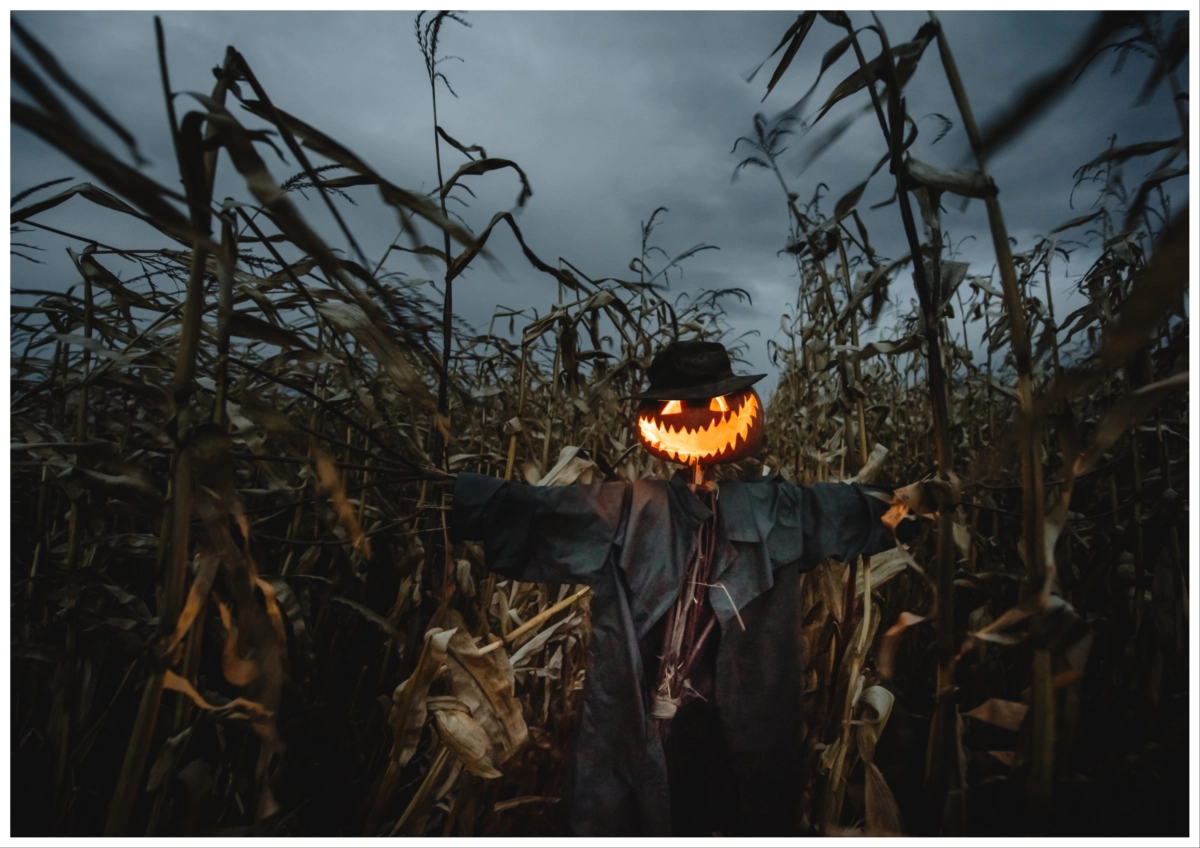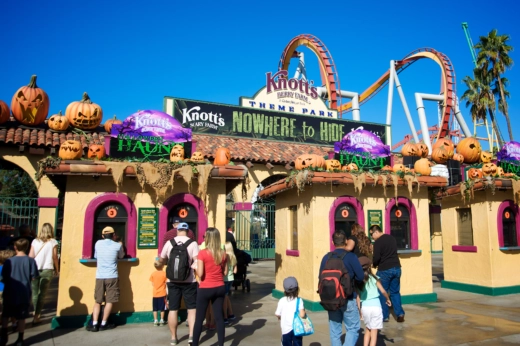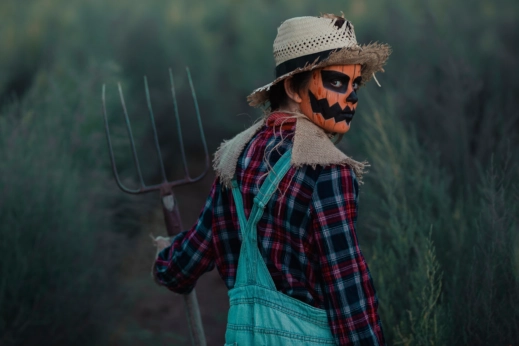The Haunting of the Farm
On the farm, haunted houses and barns invite guests into a narrative about rural identity.
The Haunting of the Farm
On the farm, haunted houses and barns invite guests into a narrative about rural identity.

A scarecrow in a cornfield.by Shutterstock
When two young members of a farming community in North Carolina fell in love, there was nothing stopping them—except the generations-old blood feud between their families. When their elopement plans were foiled, resulting in the death of her betrothed, the left-behind young woman took to the woods near the farm, forever haunting the community, and specifically, the farm she once called home.
This is the story that guests at one haunted farm are told when they visit during the Halloween season. Another haunted farm attraction in Alabama promises to bring you closer to the “creatures and killers” of the farm. Another, in South Carolina, invites you to its “desolate farm” where the inhabitants are hoping “to make you this year’s harvest!”
Haunted farm attractions are not homogenous—some are real working farms that incorporate haunted attractions into their seasonal offerings as a way to supplement farm revenue and connect with the community.
Other haunted farm attractions aren’t farms at all but haunted house businesses that use the idea of a haunted farm to inspire terror. The popularity of this concept is more than a fun seasonal activity, though. It also engages with longstanding narratives about rurality, performing them for a fearful audience.
Haunted houses and cultivating screams
Growing up a theater kid, it wasn’t hard for Betty Aquino to fall in love with farm haunted houses. After college, she found herself working for a haunted house attraction on a farm as a make-up artist. Aquino went on to do her graduate work at George Mason University and completed her thesis work on how haunted house attractions on farms rely on rural tropes that can be both empowering and problematic.
For small farms that face pressures from big agriculture and high land prices, using things such as haunted house attractions to supplement income is a way to adapt. But, in some cases, to make it work, haunted farmhouses often rely on the stereotypes of the rural “other”—the idea that whatever happens on a farm after dark is scary and unknown.
Haunted houses are more story driven than other farm attractions such as corn mazes or pumpkin picking, often relying on a pre-constructed narrative. Capitalism is a driving force in these narratives, says Aquino, informing depictions of gender, race and class and occasionally referencing a community’s own trauma. In one farm haunt she visited in Michigan, Aquino felt that what she saw was representative of the automobile industry’s history in the state. The villain in the story comes to the town and promises jobs, only to use dark magic against the town instead.
“One of their haunts has this narrative of a town that has lost its industry,” says Aquino. “And it is essentially this ghost town that’s very much a mirror of many towns in Michigan.”
The “ghost town” narrative was one Aquino saw a lot during her field research—as was “hillbilly horror.”
“I think those narratives are very reflective of their near-death experiences as farms,” says Aquino. “And they’ve had to pivot and rebuild their businesses.”

The benefits of haunted houses
Although haunted houses existed in some form or another long before this, historian David Skal argues that the popularity of haunted houses in general grew significantly after Disney opened the Haunted Mansion attraction in 1969.
As we wrote a few years back, Halloween is a holiday with deep agricultural roots. It marks both the end of the harvest season and a time of year when the connection to the spirit world is the strongest. Opening haunted houses on farms is a natural extension of this connection.
Perhaps thanks to the associations between Halloween and agriculture, many farms have had success introducing haunted farm attractions into their business. According to the USDA, between 2002 and 2017, agritourism revenue more than tripled. This figure represents more than Halloween attractions, but the fall season is a big draw for a lot of farms.
Kevin McCall, managing partner of McCall’s Pumpkin Patch in Moriarty, New Mexico, says that adding haunted attractions to the farm’s offerings has been a helpful source of revenue. The farm started by introducing a haunted hayride, but “it’s hard to haunt on a hayride,” he says. Then it added a haunted corn maze with about 50 actors and props. In the 2000s, the farm converted its cattle barn into a haunted barn attraction. It’s woven all together with the fictional narrative of a farmer who, in response to an interstate being built through the farm, begins slaughtering tourists.
McCall’s Pumpkin Patch draws visitors from Albuquerque and Santa Fe, and this season, it sold out. This showcases the significant benefit that Halloween haunts can have for farms—McCall says the business it gets from haunting allows more freedom and security with the agricultural side of the business.
“It’s allowed us to be a very different type of farmer,” says McCall.

The future of haunted farm attractions
In Rural Remix’s new podcast, “The Rural Horror Picture Show,” hosts Susannah Broun and Anya Petrone Slepyan talk about classic films in the folk horror genre and how depictions in horror films such as “Deliverance” and “The Hills Have Eyes” portray rural spaces as scary places where horrors are born. They point out that this narrative has old roots in popular culture.
When it comes to the future of haunted house attractions on farms, Aquino concludes that these haunts are a space of evolving rural identity.
As a genre, she says, horror has the ability to critique and interrogate many institutions and ideas. Rural communities are also capable of challenging the status quo—through things such as unions and initiatives such as the Black Appalachian Coalition, which works to fight the erasure of Black people from narratives about Appalachia. Rural haunts can be a space to question tropes about rurality.
“I hope that there is a return to radical roots in rural spaces,” says Aquino, “and that we continue to see more diversity in the narratives and the people working at these places.”
Halloween and agriculture have always been linked, and seasonal haunts give us the opportunity to understand that connection in today’s context.
Follow us
This work is licensed under a Creative Commons Attribution-NoDerivatives 4.0 International License.
Want to republish a Modern Farmer story?
We are happy for Modern Farmer stories to be shared, and encourage you to republish our articles for your audience. When doing so, we ask that you follow these guidelines:
Please credit us and our writers
For the author byline, please use “Author Name, Modern Farmer.” At the top of our stories, if on the web, please include this text and link: “This story was originally published by Modern Farmer.”
Please make sure to include a link back to either our home page or the article URL.
At the bottom of the story, please include the following text:
“Modern Farmer is a nonprofit initiative dedicated to raising awareness and catalyzing action at the intersection of food, agriculture, and society. Read more at <link>Modern Farmer</link>.”
Use our widget
We’d like to be able to track our stories, so we ask that if you republish our content, you do so using our widget (located on the left hand side of the article). The HTML code has a built-in tracker that tells us the data and domain where the story was published, as well as view counts.
Check the image requirements
It’s your responsibility to confirm you're licensed to republish images in our articles. Some images, such as those from commercial providers, don't allow their images to be republished without permission or payment. Copyright terms are generally listed in the image caption and attribution. You are welcome to omit our images or substitute with your own. Charts and interactive graphics follow the same rules.
Don’t change too much. Or, ask us first.
Articles must be republished in their entirety. It’s okay to change references to time (“today” to “yesterday”) or location (“Iowa City, IA” to “here”). But please keep everything else the same.
If you feel strongly that a more material edit needs to be made, get in touch with us at [email protected]. We’re happy to discuss it with the original author, but we must have prior approval for changes before publication.
Special cases
Extracts. You may run the first few lines or paragraphs of the article and then say: “Read the full article at Modern Farmer” with a link back to the original article.
Quotes. You may quote authors provided you include a link back to the article URL.
Translations. These require writer approval. To inquire about translation of a Modern Farmer article, contact us at [email protected]
Signed consent / copyright release forms. These are not required, provided you are following these guidelines.
Print. Articles can be republished in print under these same rules, with the exception that you do not need to include the links.
Tag us
When sharing the story on social media, please tag us using the following: - Twitter (@ModFarm) - Facebook (@ModernFarmerMedia) - Instagram (@modfarm)
Use our content respectfully
Modern Farmer is a nonprofit and as such we share our content for free and in good faith in order to reach new audiences. Respectfully,
No selling ads against our stories. It’s okay to put our stories on pages with ads.
Don’t republish our material wholesale, or automatically; you need to select stories to be republished individually.
You have no rights to sell, license, syndicate, or otherwise represent yourself as the authorized owner of our material to any third parties. This means that you cannot actively publish or submit our work for syndication to third party platforms or apps like Apple News or Google News. We understand that publishers cannot fully control when certain third parties automatically summarize or crawl content from publishers’ own sites.
Keep in touch
We want to hear from you if you love Modern Farmer content, have a collaboration idea, or anything else to share. As a nonprofit outlet, we work in service of our community and are always open to comments, feedback, and ideas. Contact us at [email protected].by Lena Beck, Modern Farmer
October 30, 2023
Modern Farmer Weekly
Solutions Hub
Innovations, ideas and inspiration. Actionable solutions for a resilient food system.
ExploreExplore other topics
Share With Us
We want to hear from Modern Farmer readers who have thoughtful commentary, actionable solutions, or helpful ideas to share.
SubmitNecessary cookies are absolutely essential for the website to function properly. This category only includes cookies that ensures basic functionalities and security features of the website. These cookies do not store any personal information.
Any cookies that may not be particularly necessary for the website to function and are used specifically to collect user personal data via analytics, ads, other embedded contents are termed as non-necessary cookies.